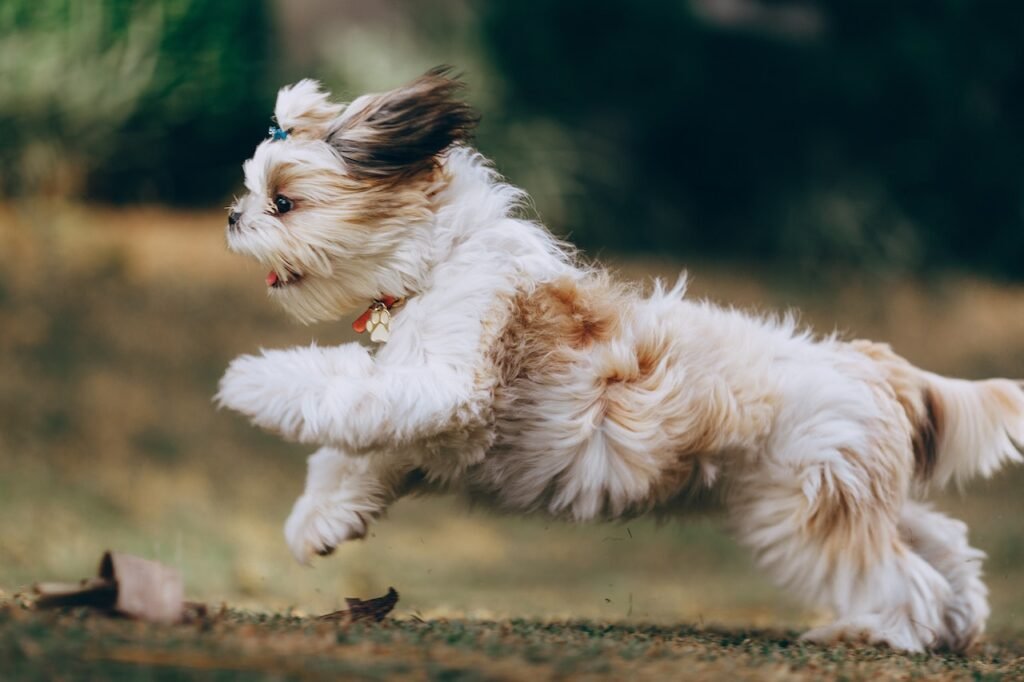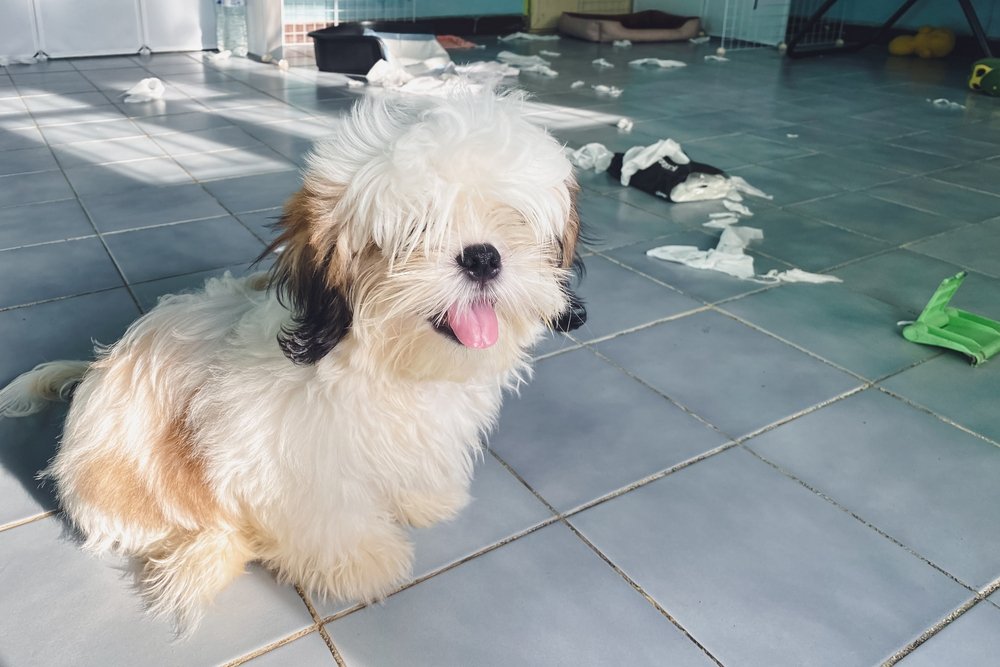Table of Contents
Do you own a beloved Shih Tzu, but they seem anxious? As a pet parent, it can be heartbreaking to witness their furry friend experiencing stress.
Understanding and managing Shih Tzu anxiety are crucial components of their overall well-being; this comprehensive guide will examine various signs and symptoms of Shih Tzu anxiety so you can easily recognize when your beloved pup may be experiencing stress.
Furthermore, we will identify root causes such as separation anxiety, loud noises, and routine changes as potential triggers – but don’t worry; we will guide you to create a relaxing environment or introduce relaxation techniques!
What Is Shih Tzu Anxiety?
Shih Tzu anxiety is a relatively common condition among dogs in this breed. It describes increased fear, worry, and stress, which manifests through various manifestations; some dogs may only show mild signs, while others could exhibit more severe symptoms that significantly interfere with daily living. Anxiety doesn’t reflect their personality or behavior but is caused by specific triggers or situations that stimulate physiological or psychological responses in these canines.
Anxiety comes in various forms for Shih Tzus, including separation anxiety, noise anxiety, and social anxiety. Separation anxiety occurs when they are left alone for too long, while loud noises like thunderclaps or fireworks may trigger noise anxiety; social anxiety refers to fear or discomfort around unfamiliar dogs or people. Understanding what specific kind of anxiety your Shih Tzu is experiencing will enable you to tailor his/her management techniques accordingly.
Shih Tzu anxiety can range in intensity and manifest through physical and behavioral symptoms. Being vigilant in identifying early warning signs to address your pet’s concerns effectively will provide timely support while potentially reducing the worsening effects of anxiety.
Common Causes of Shih Tzu Anxiety
Anxiety among Shih Tzus can have multiple root causes. Recognizing these triggers is essential in effectively managing and treating their anxiety. One such cause of Shih Tzu anxiety is separation anxiety; Shih Tzus are well known for having strong bonds with their owners, so any disruption in that bond may lead to stress for your dog.
Shih Tzus can become anxious due to loud noises. Their ears are empathetic, making them highly reactive when it comes to thunderstorms, fireworks, or construction noises that cause fear or anxiety in them. Changes to their routine or environment may also contribute to their stress; Shih Tzus tend to thrive on stability, so sudden shifts disrupt their sense of security and stability.
Traumatic experiences or abuse are also likely to contribute to anxiety in Shih Tzus. Dogs that have witnessed such events may develop an exaggerated fear response when similar situations arise in the future, making patience and understanding even more essential as their anxiety may stem from factors beyond your control.
Signs and Symptoms of Shih Tzu Anxiety
Just like humans, dogs express anxiety in different ways. Some signs may be subtle, while others are more apparent and can help identify when your Shih Tzu is stressed out.
1. Excessive barking/howling: One common sign may include excessive barking/howling by your Shih Tzu.
2. Pacing or restlessness: Anxious Shih Tzu may use excessive barking or howling to express their distress, seek attention, and exhibit restless behavior like constantly pacing back and forth or refusing to settle down.
3. Destructive Behavior: Anxiety can often result in destructive behavior from dogs, such as chewing on furniture, shoes, and other household items to alleviate their anxiety through chewing.
4. Licking/Grooming Habits: By making themselves known, anxiety manifests in dogs by excessive licking or grooming behaviors. Licking or grooming as a self-soothing mechanism when anxious: Some Shih Tzus may use excessive licking or grooming as a self-soothing mechanism when anxious.
5. Trembling or Shaking: Anxiety can manifest physically with symptoms like trembling or shaking. If your Shih Tzu trembles or shakes during stressful situations, this could indicate stress.
6. Loss of appetite: An anxious Shih Tzu may show decreased interest or need for food; stress can suppress their appetite and make them unwilling to consume their daily sustenance requirements.
7. Avoidance/Hiding: Dogs experiencing anxiety may try to avoid certain situations by hiding from certain situations or avoiding behavior used to feel secure and safe.
8. Excessive Drooling: Anxiety can cause Shih Tzus to drool more frequently than usual, indicating stress.
By paying close attention to these signs and symptoms, early intervention and support services can be provided to ease his/her anxiety levels.

How to Identify if Your Shih Tzu is Experiencing Anxiety
Determining whether your Shih Tzu is experiencing anxiety can be challenging, with symptoms often overlapping with behavioral or medical issues. Here are a few steps that will help you identify whether they’re experiencing it:
1. Monitor Changes in Behavior:
Pay close attention to any noticeable behavioral shifts among your Shih Tzu, such as withdrawal, restlessness, or clinginess, that might signal anxiety.
2. Assess Physical Reactions:
Noticing any physical reactions such as trembling, excessive panting, or drooling could indicate anxiety in Shih Tzus.
3. Think About Context:
Keep track of situations or triggers that lead to discomfort or anxiety for your Shih Tzu, noting specific patterns or triggers to address their root causes more effectively.
4. Consult With A Veterinarian or Professional:
If your Shih Tzu is experiencing anxiety, consulting a veterinarian or professional dog behaviorist is always wise. They can rule out any underlying medical conditions while offering guidance to manage his anxiety effectively.
Consider that every dog is different and that anxiety could present differently for each pup.
Common Triggers of Shih Tzu Anxiety
Recognizing what causes anxiety can help you take proactive measures to manage and ease your stress. While all dogs differ, some triggers are more commonly associated with Shih Tzus. Here are a few that you should keep an eye out for:
1. Separation Anxiety:
Shih Tzus are known for their attachment to their owners, and being left alone can often trigger separation anxiety, manifested as excessive barking, destructive chewing, and house soiling.
2. Loud Noises:
Shih Tzus have sensitive hearing, and loud noises like thunderclaps, fireworks, or vacuum cleaners may trigger anxiety and fear. Such loud sounds may even overwhelm their system and trigger stress responses.
3. Changes in Routine or Environment:
Shih Tzus are creatures of habit, and sudden changes can hinder their sense of security – including shifts in their daily schedule or moving to a new home and welcoming strangers or pets into their environment.
4. Traumatic Experiences:
Past trauma, such as abuse or accidents, may hurt a Shih Tzu’s emotional well-being, leading to continued anxiety that manifests differently each time it arises.
Tips for Handling Shih Tzu Anxiety at Home
Managing Shih Tzu anxiety at home requires understanding, patience, and practical techniques. Here are a few suggestions to reduce their stress:

1. Establish a Routine:
Shih Tzus are creatures of habit, so creating a set daily schedule that provides stability is critical for their well-being and can reduce anxiety levels. Sticking to regular feeding times, exercise sessions, and sleep hours is vital in providing security for both pet parent and pup.
2. Establish a Safe Space:
Provide your Shih Tzu with a designated area where they can retreat when anxious. This could include their bed or crate with comforting items like their favorite toys or blanket scented with your scent.
3. Utilize Positive Reinforcement:
Reward calm and relaxed behavior with treats and praise to associate it with positive experiences – reinforcing confidence while decreasing anxiety levels in your Shih Tzu.
4. Implement Relaxation Techniques:
Utilize relaxation techniques such as massage, aromatherapy, or music therapy to help relax and comfort your Shih Tzu. These methods can create a soothing environment.
5. Gradual Desensitization:
Suppose your Shih Tzu is anxious around specific triggers, such as loud noises. In that case, you can gradually desensitize them over time by gradually increasing motivation levels until they remain calm – rewarding them if they remain so!
6. Engage in mental and physical exercise:
Engaging in both mental and physical exercise can help Shih Tzus overcome anxiety. Try engaging in activities such as puzzle toys, obedience training, or daily walks as forms of mental stimulation while offering physical outlets for his energy.
7. Avoid Punishment:
Punishing Shih Tzus can increase their anxiety, reinforcing negative and fearful associations. Instead, focus on positive reinforcement or redirection techniques to promote desired behaviors and increase success rates.
Managing Shih Tzu anxiety requires patience and consistency; dedication can help your furry pal feel more relaxed and secure.
Professional Help for Shih Tzu Anxiety – Dog Trainers and Behaviorists
Although most cases of Shih Tzu anxiety can be managed at home, seeking professional assistance may be essential in managing it effectively. Dog trainers and behaviorists are experienced professionals trained to identify issues within dogs; thus, their assistance may be invaluable in controlling his anxiety levels.
Professional dog trainers can assist in creating a tailored training plan to address specific triggers and behaviors related to Shih Tzu anxiety. Through techniques such as counterconditioning and desensitization, these experts can assist in helping your Shih Tzu overcome their fears and anxieties.
If the anxiety of your Shih Tzu is severe or significantly impacting your quality of life, a behaviorist is highly recommended. An animal behavior specialist will conduct a comprehensive assessment, create a tailored behavior modification plan, and prescribe additional interventions such as medication.

Natural Remedies for Shih Tzu Anxiety
Natural remedies may provide another avenue of support for Shih Tzus, who suffer from anxiety. As with behavioral interventions and professional assistance, they should only be used alongside professional advice instead of replacing it altogether. Here are a few natural solutions that might help your anxious Shih Tzu:
1. Herbal supplements:
Herbal remedies such as chamomile or valerian root can provide anxiety-reducer properties in dogs. However, before adding new supplements into their routine, consult a veterinarian first.
2. Essential Oils:
Essential oils like lavender and chamomile can provide your Shih Tzu with an environment conducive to relaxation, helping them unwind after an exhausting day at the park. However, their use must be undertaken carefully as some essential oils may be toxic for dogs.
3. Thundershirt:
A Thundershirt is a snug-fitting garment that provides gentle pressure to help calm anxious dogs. This soothing pressure has proven particularly useful when managing anxiety in Shih Tzus during stressful situations.
4. Calming Music:
Playing relaxing or white noise music can help reduce loud noises and create an oasis of comfort for your Shih Tzu. There are playlists created specifically to aid relaxation for dogs that can promote this.
Consult a veterinarian or professional before giving your Shih Tzu any natural remedies to ensure they are suitable.
Assuring Your Shih Tzu of a Safe and Stress-Free Environment
Establishing an environment conducive to anxiety-free living conditions is paramount in keeping your Shih Tzu content. Here are some helpful suggestions for creating such an atmosphere:
1. Reduce Loud Noises:
To minimize loud noise exposure for your Shih Tzu, employ soundproofing techniques or close windows during thunderstorms or fireworks displays as needed, and provide safe places where she can retreat when necessary.
2. Establish and Keep to a Regular Schedule:
Create a set routine that gives your Shih Tzu the sense of security and predictability they need – such as feeding times, exercise sessions, and sleep patterns.
3. Limit Changes in Environment:
Shih Tzus thrives on routine and familiarity, so to provide maximum comfort during any transitions between environments, it is wise to introduce changes gradually and provide extra reassurance and support during such changes.
4. Provide Mental and Physical Stimulation:
Engage your Shih Tzu in mentally stimulating activities such as puzzle toys or obedience training to reduce anxiety while providing an outlet for their energy.
5. Ensure a Comfortable Resting Space:
Make a comfortable and soothing space for your Shih Tzu. Provide them with soft bedding or blankets in a quiet spot where they can retreat when anxious and practice relaxation techniques as much as possible.
Utilize relaxation techniques such as massage, aromatherapy, or soothing music to create a peaceful environment for your Shih Tzu.
Conclusion
Understanding and managing Shih Tzu anxiety are crucial for the well-being of these adorable dogs. By understanding the signs and triggers of stress, you can take proactive steps to provide comfort and support for your furry friend. Creating a safe environment, employing behavioral techniques, or seeking professional help may all be effective ways of alleviating their fears – the key here being patience and consistency to help your Shih Tzu overcome their fears and lead a more relaxed, joyful existence – embrace this journey of understanding to make a significant positive difference in their wellbeing!
FAQs
Is Shih Tzu’s anxiety curable completely?
While a complete cure may not always be achievable, symptoms of anxiety in Shih Tzu dogs can often be substantially improved with proper management and care. Identifying triggers and developing effective strategies will allow your pet to live more relaxed and stress-free lives.
Will Socialization Reduce Shih Tzu’s Anxiety?
Absolutely. Exposing your dog gradually to new people, dogs, and environments can help build their confidence while decreasing any fear or discomfort they might feel in social settings.
Is It Okay to Leave an Anxious Shih Tzu Alone for Extended Periods?
To help prevent separation anxiety in Shih Tzus, gradual desensitization techniques may help create a safe space to help them cope when alone for an extended period.
Are There Any Warning Signs I Should Look Out For With My Shih Tzu’s Anxiety?
In cases where Shih Tzu anxiety is severe or persistent enough to impact your quality of life negatively, seeking guidance from a veterinarian or certified dog behaviorist for creating a personalized management plan could be invaluable.
Can I administer over-the-counter anxiety supplements to my Shih Tzu without consulting a veterinarian?
Before giving your Shih Tzu any over-the-counter anxiety supplements, always check with a veterinarian first. Not all supplements are suitable for dogs, and your veterinarian can suggest the most suitable options based on his/her individual health status and individual needs.
